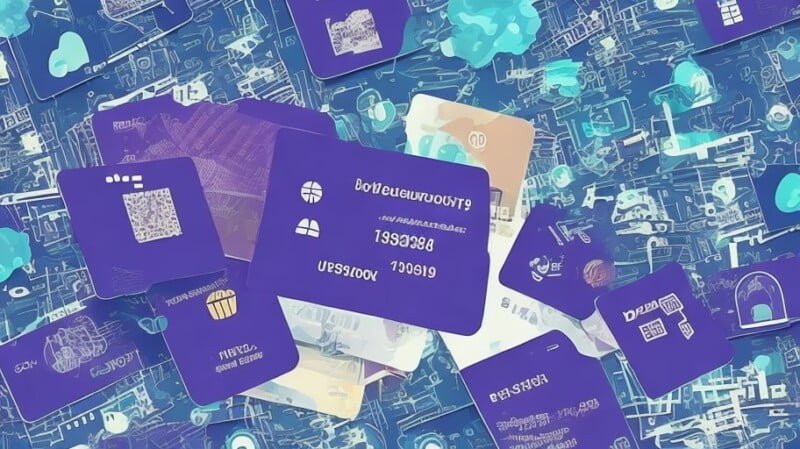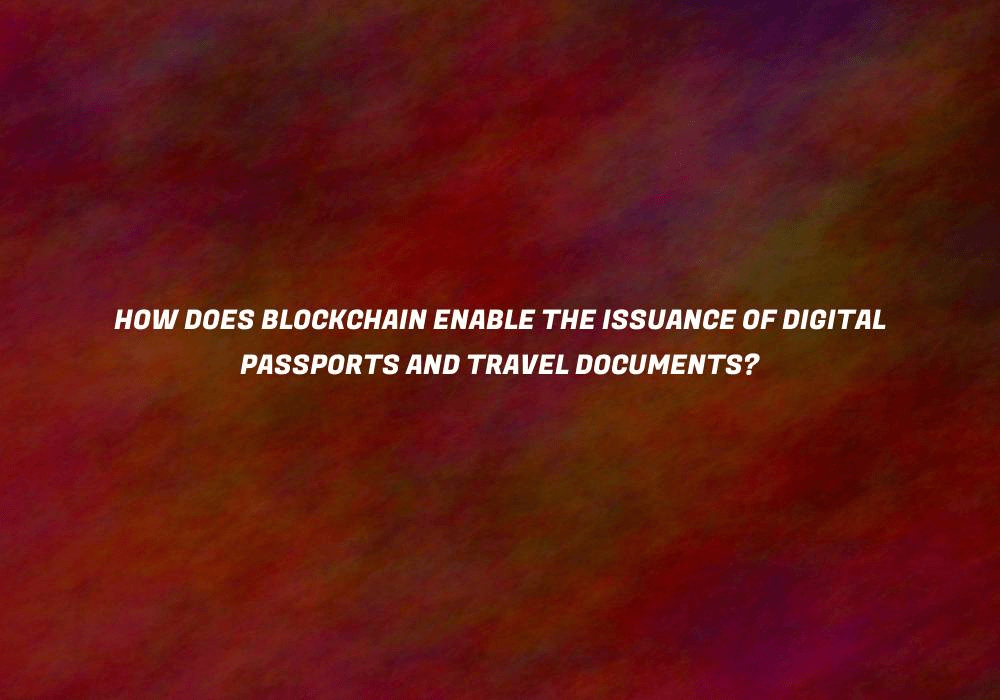Imagine a world where you can easily travel across borders without the hassle of carrying physical passports and travel documents. Sounds like a dream, right? Well, thanks to the power of blockchain technology, this dream is becoming a reality. Blockchain is revolutionizing the way we handle sensitive information, and in this article, we will explore how it enables the issuance of digital passports and travel documents. Get ready to embark on a journey where convenience and security go hand in hand, all with the help of blockchain.
Overview
Introduction to blockchain technology
Blockchain technology has emerged as a revolutionary solution to numerous challenges faced by various industries, including the global passport and travel document systems. In an era where digitalization has become the norm, traditional passport systems face increasing challenges such as identity fraud, data breaches, and inefficient processes. Blockchain technology offers a secure and efficient solution to address these issues. By leveraging the decentralized nature of blockchain, governments and organizations can issue digital passports and travel documents that enhance security, privacy, and streamline the entire process.
The Need for Digital Passports and Travel Documents
Emerging challenges in traditional passport systems
The traditional method of issuing physical passports and travel documents has its limitations. It is susceptible to identity fraud and tampering, putting the security and privacy of individuals at risk. Additionally, the processes involved in issuing and validating these documents often rely on centralized authorities, leading to inefficiencies, delays, and increased costs. In a world that is increasingly interconnected and reliant on digital technologies, there is a growing need for an innovative solution that can address these challenges and provide a more secure, efficient, and cost-effective alternative.
Understanding Blockchain Technology
Definition and basic concepts of blockchain
Blockchain is a distributed ledger technology that allows the secure storage and transfer of data across a network of computers. Unlike traditional databases or centralized systems, blockchain relies on a decentralized network of nodes, making it more resistant to tampering and hacking attempts. Each block in the blockchain contains a set of data, along with a timestamp and a unique identifier called a hash. These blocks are linked together using cryptographic protocols, creating an immutable and transparent chain of transactions. Blockchain technology offers several key features, including transparency, security, immutability, and decentralization, which make it an ideal solution for issuing digital passports and travel documents.
Benefits of Blockchain for Issuing Digital Passports and Travel Documents

Enhanced security and privacy
One of the primary benefits of using blockchain to issue digital passports and travel documents is enhanced security and privacy. By utilizing sophisticated cryptographic algorithms, blockchain ensures that the information contained in these documents remains secure and tamper-proof. The decentralized nature of blockchain also reduces the risk of data breaches and identity fraud by eliminating the need for a centralized database or authority. Individual users have control over their own data, and any changes or updates to their digital passports can be securely recorded on the blockchain, providing a transparent and auditable trail of transactions.
Immutable Digital Identity
Creating a unique digital identity for individuals
Blockchain technology enables the creation of a unique digital identity for individuals, which can be securely linked to their digital passports and travel documents. This digital identity is based on cryptographic keys and can be stored on the blockchain, eliminating the need for physical documents and reducing the risk of identity theft or loss. The digital identity can be accessed by authorized parties, such as government agencies or airlines, to verify the authenticity of the individual and their travel documents. This ensures that only authorized individuals can access and use the digital passports, further enhancing security and privacy.
Decentralization and Interoperability
Removing reliance on centralized authorities
The decentralized nature of blockchain technology eliminates the need for centralized authorities in issuing and validating digital passports and travel documents. Instead of relying on a single governing body or authority, the blockchain network allows for multiple nodes to validate and authenticate the documents, ensuring consensus and immutability. This decentralization enhances security, as it reduces the risk of corruption or collusion by any single entity. Interoperability is another key advantage of blockchain, as it allows different countries and organizations to seamlessly exchange and verify digital passports and travel documents, reducing bureaucratic hurdles and improving efficiency.
Smart Contracts and Automation
Automating processes and reducing human error
Smart contracts, which are self-executing contracts with the terms of the agreement directly written into code, play a crucial role in the issuance of digital passports and travel documents using blockchain technology. These smart contracts automate processes, such as identity verification, document issuance, and document validation, reducing the reliance on manual intervention and minimizing the chances of human error. With smart contracts, the entire process becomes streamlined, transparent, and efficient, ensuring a seamless experience for travelers and government agencies alike.
Verification and Authentication
Improved methods for verifying document authenticity
Blockchain technology provides improved methods for verifying the authenticity of digital passports and travel documents. Each transaction on the blockchain is recorded and cannot be altered or deleted, ensuring the integrity of the data. By leveraging cryptographic algorithms, government agencies, airlines, and other authorized entities can easily verify the authenticity of a document by comparing the cryptographic hash stored on the blockchain with the one calculated from the document. This eliminates the need for manual document inspection and reduces the risk of counterfeit documents, enhancing security and trust in the travel industry.
Efficiency and Cost Reduction
Streamlining passport issuance and validation processes
The use of blockchain for issuing digital passports and travel documents significantly improves the efficiency of the entire process. By eliminating the need for physical documents, the issuance and validation processes become faster and more streamlined. Individuals can apply for and receive their digital passports online, reducing the time and effort required for manual processing. Government agencies and other organizations involved in the verification process can access the necessary information securely and in real-time, minimizing delays and increasing operational efficiency. Furthermore, the digitization of these documents reduces administrative costs, such as printing, storage, and distribution, resulting in significant cost savings for both governments and travelers.
Real-World Examples
Countries and organizations leveraging blockchain for digital passports
Several countries and organizations have already begun exploring the use of blockchain technology for digital passports and travel documents. Estonia, for example, has implemented a digital identity program called e-Residency, which allows individuals to obtain a digital identification card that can be used for various online services, including travel document issuance. The United Arab Emirates is also piloting a blockchain-based digital passport system, aiming to enhance security, streamline processes, and provide a seamless travel experience. Additionally, organizations like the International Air Transport Association (IATA) are actively exploring blockchain solutions to improve the efficiency and security of the entire travel documentation process.
In conclusion, blockchain technology offers a transformative solution to the challenges faced by traditional passport systems. By leveraging decentralization, transparency, and security, blockchain enables the issuance of digital passports and travel documents that enhance privacy, reduce fraud, and streamline the entire process. With the potential to revolutionize the travel industry, blockchain technology is paving the way for a more secure, efficient, and cost-effective future of global travel.
